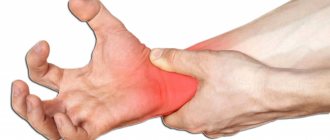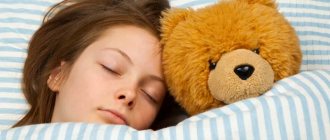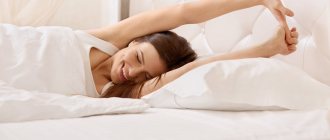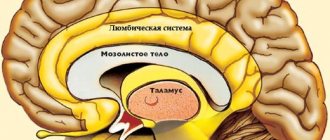27.01.2021
In old age, healthy sleep means a lot; an old person needs balanced rest, a comfortable sleeping place and a normal daily routine. However, as practice shows, many pensioners stay awake at night, suffer from insomnia or do not get enough sleep due to psychological disorders. The reasons for this condition can be varied - stress experienced the day before, pain that worsens at night, or specific diseases that should be treated by specialists.
Causes of sleep disorders in the elderly
At night, many older people experience a feeling of anxiety and restlessness, succumb to internal experiences, analyze their day, feel sorry for themselves, and remember their untimely departed friends and relatives. All this affects the quality of rest - old people fall asleep for a long time, often wake up and sometimes even walk at night, staying in the “kingdom of Morpheus”.
Insomnia can be caused by:
- incorrect daily routine - often retirement leads to the fact that a person stops following his usual schedule, goes to bed late and is in no hurry to get up in the morning;
- lack of physical activity - old people simply do not expend accumulated energy and do not have time to get tired;
- diseases accompanied by pain - chronic pain, neurological diseases, pathologies of the cardiovascular system prevent a pensioner from sleeping if they are not treated;
- depression – problems that accumulate like a lump, leading to chronic lack of sleep;
- long-term use of sleeping pills – long-term therapy with sedative medications does not make them effective, reduces their effectiveness and triggers the opposite effect;
- conditions that require improvement - unsuitable humidity, temperature, lighting, uncomfortable mattress, too warm or cold blanket, high pillow negatively affects the comfort of the sleeping person;
- life's troubles, stress, unpleasant events do not allow you to relax and fall asleep quickly;
- high blood pressure, snoring, tachycardia, poor cerebral circulation and other somatic diseases in people over 60 years of age negatively affect the quality of rest of an elderly patient;
- senile dementia, Parkinson's disease, Alzheimer's disease, etc.
It is difficult to fall asleep after a heavy dinner; insomnia often accompanies those who do not go to bed on an empty stomach. Contrary to the popular belief that alcohol accompanies relaxation, drinking alcohol excites the nervous system and interferes with proper rest in old age.
Causes of insomnia
Insomnia is more common in women than in men. And in pregnant women it is observed in 75% of cases. Women are susceptible to the disease during menopause, when hormonal changes cause a surge in thyroid activity in the evening and at night. This is accompanied by tachycardia, sweating and inability to sleep.
Insomnia has a large number of causes, some of which are related to a person’s lifestyle:
- poor sleep hygiene – extraneous noise, bright lights, constant vibration or uncomfortable bed;
- stressful conditions – severe psychotraumatic situations, unusual sleeping conditions, nervous overstrain;
- changing time zones, working at night;
- mental illness – depression, anxiety disorders;
- the effect of psychoactive substances - alcohol abuse, smoking, large amounts of caffeinated drinks, medications from the group of nootropics, antipsychotics, antidepressants;
- pregnancy - insomnia is associated with changes in the functioning of the nervous system, discomfort and difficulty breathing due to a large belly.
Night sleep disturbances can be caused by somatic diseases. Digestive problems, heart and vascular diseases, and increased activity of the thyroid gland lead to insomnia. Pain and aches in the joints due to arthritis or ARVI will also prevent you from falling asleep.
In older age, insomnia is associated with age-related changes in the brain, the development of Parkinson's disease, dementia and other neurological causes. But regardless of the factors due to which a person cannot sleep, the problem requires treatment.
Symptoms of sleep disorders in the elderly
Therapy for insomnia is based on combating the symptoms of the disease, which requires careful diagnosis; drugs are selected based on an analysis of the general condition of the elderly patient. The disorder at a respectable age is manifested by the following symptoms:
- difficulties falling asleep, which you have to struggle with periodically;
- increased frequency of unpleasant dreams that make you wake up in a cold sweat with a feeling of fear, powerlessness, regret, accompanied by a rapid heartbeat;
- rest has become superficial, you often wake up at night, sleep lightly, are distracted by the slightest movement or rustle;
- waking up too early, inability to fall asleep again;
- You have to fight the signs of fatigue even after a full 8-hour rest.
Depending on the course of the disease and its symptoms, two types of insomnia are distinguished: transient - often caused by stress, recovery occurs on its own within 7-14 days; chronic – problems become regular, sleep disorders persist for more than 4 weeks; specific therapy is required to recover.
Nervous insomnia
Often an over-nervous person cannot fall asleep, and even if he does fall asleep, he has nightmares. In such situations, the following recipes for insomnia will be effective:
- You need to prepare the tincture in the evening. Mix fresh or dry mint and sweet clover leaves (75 g and 100 g). Pour a spoonful of the resulting mixture into a jar and pour boiling water over it. Leave to brew until morning. You need to take 50 ml on an empty stomach;
- Dill helps well against insomnia. Prepare as follows: mix 0.5 liters of wine and 50 grams. dill seeds For the recipe, you need to use mainly red wine, for example, Port or Cahors. Cook over low heat for 15 minutes, then leave in a warm place for an hour to infuse. Then you need to strain the tincture and squeeze lightly. The composition is used daily before bed, the dosage is 50-60 g. in one go;
- for those who are prevented from sleeping normally by nightmares, a tincture of white wine (0.5 l) and onion seeds (25 g) is suitable. Leave for 10 days, shaking the mixture regularly. Then you need to strain the finished tincture every morning, 1 tbsp. take a spoonful on an empty stomach, and then every 4-5 hours throughout the day;
- Garlic is highly effective against insomnia caused by nervous strain. Peel the head of garlic, chop the cloves into a pulp and place in a jar. Next, pour boiling water over 5 lemons or 10 limes. Add the juice squeezed out of the fruit to the garlic pulp, cover the container with a thick cloth and tie the neck. Leave for 3 weeks, shaking regularly. Store the finished mixture in the refrigerator. Take for two weeks approximately 15 minutes before bedtime, dissolving 1 tsp in 100 ml of water. mixtures.
Forms of manifestation of insomnia
Insomnia affects the quality of life, makes a person irritable, nervous, and leads to serious psychological disorders. It is customary to distinguish three forms of unhealthy condition:
- Insomnia. The pathology is characterized by the inability to fall asleep, even if you manage to forget yourself, the rest is short and restless. Usually the condition is caused by psychological stress; eliminating the root causes leads to normalization of the daily routine. A psychotherapist should treat such patients.
- Hypersomnia. Unlike insomnia, a patient suffering from hypersomnia needs a long rest - from 12 to 22 hours. Even after almost a day's stay in bed, the feeling of vigor does not occur, the patient is unable to regain strength, looks tired, suffers from nervous excitement, or, on the contrary, looks disoriented and confused. The disease is diagnosed in people living in conditions of constant stress.
- Parasomnia. Sleep disorders occur in separate phases; a person has to get out of bed several times a night, often in a sleepy state. The cause of the painful condition is epilepsy, sleepwalking, urinary incontinence, phobias, pain during erection in men.
Based on the diagnosed form, appropriate therapy is selected, which is designed to normalize the daily routine of the elderly patient.
Problems sleeping due to overexertion
For people who suffer from sleep disturbances due to physical or mental fatigue, the following infusions will help get rid of the problems:
- Mix equal parts black currant and rose hips (you can use both fresh and dry). Pour boiling water per 1 tbsp. l. mixture 400 ml. liquids. Leave in a thermos for about 6-7 hours. Strain the infusion and drink half a glass 3-4 times a day. The composition provides a greater effect if you drink it warm. If you wish, you can add a little honey for sweetness, but under no circumstances add sugar. This drink is highly fortified and well restores strength and relieves fatigue;
- Infuse 100 grams of horseradish roots into 1 liter of white wine for 10 days, shaking the mixture every day. After insisting, strain. Take 1 tbsp of medicine three times a day. spoon. To avoid stomach irritation, you should drink it with milk;
- propolis has a positive effect on the general condition of a person. Mix 90 ml of alcohol with 10 g. Propolis and leave for 14 days. If you need to quickly prepare the composition, you need to heat the dishes with alcohol in a water bath to 40-50°C, then add propolis. When cool, strain and the tincture is ready for use.
Traditional methods of treatment
Unlike traditional medicines, “grandmother’s” methods have no contraindications or side effects, are accessible to everyone and do not require large financial expenditures. Elderly people often resort to well-known recipes from the people:
- Valerian root. An effective, safe plant that has a pronounced calming and sedative effect. In accordance with the instructions, you should take the tincture or tablets for several weeks, since the active substance has a cumulative effect. However, some reviews say that the drug immediately relieves symptoms and makes it possible to sleep well on the first night after taking it. To mask the specific taste of valerian, it is recommended to drink the tablet form or take a tincture with mint essence to give the drink a more pleasant taste.
- A glass of milk at night. Grandma's old method is an effective way to set the body up for rest. The effectiveness of the method lies in the amino acid tryptophan, which is part of milk. The component helps the brain launch processes that switch the body into sleep mode. If you are not a big fan of milk or don’t want to drink liquid before going to bed, try eating some legumes, white meat chicken, and cottage cheese for dinner.
- Chamomile tea. Chamomile decoction is widely used in the treatment of insomnia and improving psychological well-being throughout the world. To enhance the effect, you can add a few drops of essential chamomile oil to your evening bath to overcome frustration, relax and tune in to the right atmosphere. It is recommended to drink herbal tea no more than 3 times a day; if desired, you can add honey to the drink.
In addition to traditional desktop activities that require the presence of two or more participants, old people are often carried away by their computer counterparts. Based on the results of recent studies, retirees enjoy spending time on the computer, mastering social networks, popular computer applications and simulators. Particularly popular among old people are “adventure games”, toys for logic, quick reaction and simple strategies. In this case, the computer allows you to maintain mental health, develop intellectual abilities, and prevent the occurrence of diseases of the nervous system. You can download any application to your computer; you can find free versions or inexpensive computer games.
The following herbal components are designed to combat sleep disorders: lemon balm, mint, lemongrass, parsnip, lavender, oregano, creeping thyme, sage, hops, celery root and others. Aromatherapy relieves sleep disorders. Inhaling the aroma of lavender or rose promotes relaxation; just drop a few drops on your pillow, light an aroma lamp, or fill your bedroom with the scent of incense sticks. In addition, reading a book in bed, meditation, and even calling a friend or close relative will help restore your routine.
Honey sleep comrade
Traditional medicine, and in this it is fully supported by official medicine, actively uses honey to normalize sleep. There are many recipes, and they are very different.
With milk
For many, the main means for a good sleep has become honey with milk: a glass of warm milk with a teaspoon of honey - and straight to bed. Sleep won't take long to arrive.
USEFUL INFORMATION: Insomnia: what to do at home, how to get rid of it, treatment methods
Plus cinnamon
Even with strong excitement, cinnamon added to honey milk will help you fall asleep. A third of a teaspoon of spice is enough per glass. The mixture is placed on the fire, but not brought to a boil, cooled to a warm state, add 5 drops of vanilla extract and honey to taste.
With kefir
Sleep disorders are often combined with problems in the gastrointestinal tract. A glass of kefir with a tablespoon of honey will help here. The mixture will be a good replacement for dinner and will ensure a restful night.
With apple cider vinegar
3 tbsp. l. Thoroughly mix apple cider vinegar into 200 g of honey. Take 2 teaspoons before going to bed. If you wake up at night, you can repeat the drug.
With apples
At night, grate a few sour apples, mix with honey, eat right away - insomnia will go away.
With Borjomi
1 tbsp. l. honey is diluted with the same amount of mineral water and half a spoon of finely chopped lemon. Take in the morning for a month.
With lemon and walnuts
Add 2 tbsp to lemon juice (1 glass). l. honey and chopped walnuts. Use before bed. For one dose – a tablespoon.
Just with water
Drink a glass of warm honey water before bed. To enhance the effect, apply lavender oil to your temples.
Attention! For some, bee products are strong allergens. For people with an allergic reaction to honey, it is strictly contraindicated to combat insomnia.
Choosing the right insomnia remedy for an elderly person
There are medications whose action is aimed at correcting such disorders; they should be taken only with a prescription and the recommendation of a doctor. If a person suffers from insomnia, cannot fall asleep on his own, suffers from nightmares, or does not get enough sleep even after a long rest, the doctor prescribes adaptogens containing melatonin to patients.
To combat the symptoms of senile insomnia, you will need to take medications with a pronounced anti-anxiety effect. If an elderly person suffers from individual intolerance or one of the components causes an allergic reaction, the doctor prescribes non-benzodiazepine benzodiazepine receptor agonists, which do not affect the respiratory system and are not prone to accumulation. Psychotherapists often prescribe herbal remedies for older people to normalize rest and wakefulness: “Persen”, “Sedasen”, “Novo-Passit”, “Motherwort”, etc.
Combination drugs containing phenobarbital have a good effect for treating insomnia in pensioners. A group of medications is recommended to be taken for insomnia in particularly severe cases, accompanied by increased nervous excitability. Long-term use of these medications is fraught with addiction, negatively affects the general condition, and aggravates problems with falling asleep.
Medicines with nootropic effects - “Glycised”, “Glycine” - are good for senile insomnia. Effective remedies for insomnia normalize brain function and relieve irritability. It is strictly forbidden to combine the use of sleeping pills with alcohol and antihistamines. Carelessness can lead to urination problems, headaches, tachycardia and more serious side effects.
Prevention of insomnia
The main measures to prevent insomnia are:
- refusal of daytime sleep;
- going to bed at the same time;
- refusal to sleep if you don’t feel like sleeping;
- avoidance of caffeinated drinks (especially in the evening);
- daily walks in the fresh air before bedtime;
- hardening the body, strengthening the immune system;
- physical activity, physical education;
- giving up bad habits (tobacco smoking, alcohol abuse);
- refusal of uncontrolled use of sleeping pills without a doctor’s prescription;
- creating comfortable conditions for falling asleep;
- avoiding stress;
- proper nutrition, avoidance of fast food and other junk food;
- weight control.
Treatment of senile insomnia at the Doctor SAN clinic
At the Doctor SAN clinic, we perform a broad diagnosis of sleep disorders before prescribing treatment for insomnia in older people. After a detailed interview, the doctor will determine the remedy suitable for a particular patient.
In the vast majority of cases of sleep disturbance in elderly and elderly people, the use of psychotherapy methods shows a good effect, and hypnotherapy sessions are also recommended for patients. And only if there is a special need, the doctor will prescribe a sleeping pill suitable for a specific situation.
If there is a suspicion of pathology of internal organs, additional examinations will be recommended. Here you can undergo ECG, EEG, ultrasound. Also in our clinic you can get advice from a therapist, endocrinologist, neurologist-epileptologist. If necessary, you can contact a somnologist and get a polysomnogram. In the vast majority of cases where sleep disturbance occurs in the elderly, treatment leads to a significant improvement in the patient's condition.
Effective remedies for insomnia for the elderly
Insomnia affects people of all ages: teenagers and young adults, adults and the elderly.
The causes of sleep disturbance can be very different. In the younger population, insomnia is most often caused by stress or medication. Teens and children may have difficulty sleeping due to hormonal surges. However, it is the elderly who most often suffer from insomnia. How to cure insomnia in old age? You should not immediately resort to medication. If the disease has not reached the chronic stage, first of all you need to try to bring the body to a state in which it wants to fall asleep on its own. How to deal with insomnia in the elderly? We offer you some simple tips that you can follow to overcome insomnia.
- Review your daily routine (spend your days as actively as possible).
- Try to establish a sleep-wake schedule (limit daytime rest to 20-30 minutes).
- Try to eat right – it’s especially important not to overeat before bed!
- Ventilate the room regularly (18-22 degrees is the optimal temperature for healthy sleep).
- Don't watch TV before bed. Give preference to reading or listening to soothing music.
If insomnia has become chronic or severe, you can use various drugs and medicines to normalize sleep. However, do not forget that taking any medications must be accompanied by a visit to the doctor. The doctor will select the appropriate remedy and prescribe the correct daily dosage. Have a good and restful sleep!
Insomnia with dementia: what to do and how to help
There is no standard, template method for treating insomnia in dementia.
Each case is considered by specialists individually. This is primarily due to a large number of pathogenetic mechanisms preceding the disease. With dementia, patients often experience emotional disturbances. Therefore, in cases of severe depressive moods, antidepressants are prescribed. The duration of therapy is directly affected by the severity of the pessimistic state. In most cases, it lasts about six months, since antidepressants produce a cumulative effect, and the first positive changes are observed a few weeks after starting treatment. Nootropic drugs are used as mandatory drugs for the treatment of insomnia in dementia of any type. They help improve cognitive performance and are effective for memory recovery. In addition, modern drug therapy often uses tranquilizers to relieve anxiety and fear.
Recommended articles to read:
- Social services for older people
- Diseases of old age
- Valuable tips on how to choose a boarding house
In case of senile dementia, the patient should be provided with regular intake of sedatives, sedatives, hypnotics, and medications that improve blood circulation in the brain and slow down the breakdown of cells. For example, very often doctors prescribe Phenozepam, which relieves symptoms of insomnia, anxiety and other psychotic conditions. Dementia should not be treated at home for any severity or type of disease. The selection of drugs should be carried out only by a doctor, which will eliminate the possibility of developing undesirable effects. Patients are strongly discouraged from taking medications that reduce concentration and also negatively affect memory.
Read material on the topic: Health of older people
Diagnostics
If insomnia is associated with impaired melatonin production, medications are prescribed.
If a patient is diagnosed with mental illness or psychological problems that contribute to disturbances in the quality of night's rest, treatment with a psychologist or psychotherapist is indicated.
For diseases of the nervous system, the patient is examined by a neurologist. Diagnostic procedures are prescribed such as:
- MRI of the brain;
- CT;
- Ultrasound of internal organs;
- Ultrasound of the thyroid gland;
- sugar test;
- Analysis of urine.
Common insomnia
Many people simply cannot sleep for a long time for no particular reason or wake up in the middle of the night. In such cases, honey helps against insomnia. This is a quickly digestible natural product that contains amino acids and enzymes that are beneficial to the body. A person who eats just 1 spoon of honey during dinner falls asleep much faster.
If you wake up at night and can’t fall asleep, then you need to eat 2 tsp. a mixture of honey and apple cider vinegar, this combination helps with insomnia. It’s easy to prepare: mix 3 tablespoons of vinegar with 300 gr. honey This composition can also be consumed about half an hour before bedtime.
No less effective is fresh goat milk for insomnia. You can also drink cow's milk, but it takes a little longer to digest. Sleep will be more peaceful and deeper if you add a couple of drops of valerian tincture or a teaspoon of honey to milk.
Note! You need to drink milk warm and while lying in bed, then you can soon forget about sleepless nights forever.
The importance of healthy sleep in old age
Sleep is an integral part of life at any age. But for older people it plays a special role.
It depends on him:
- healthy weight of a person;
- risk of stroke and heart attack;
- a charge of strength, vigor and energy for the next day;
- immunity and protective properties of the body;
- blood pressure (especially in the case of hypotensive patients);
- calmness and strength of the nervous system;
- lack of internal tension.
Full and high-quality sleep helps the body quickly recover from illness or injury. It normalizes physical and mental health. Sleep disorders, on the contrary, trigger destruction, aggravation of diseases, the occurrence of depression and its consequences.










